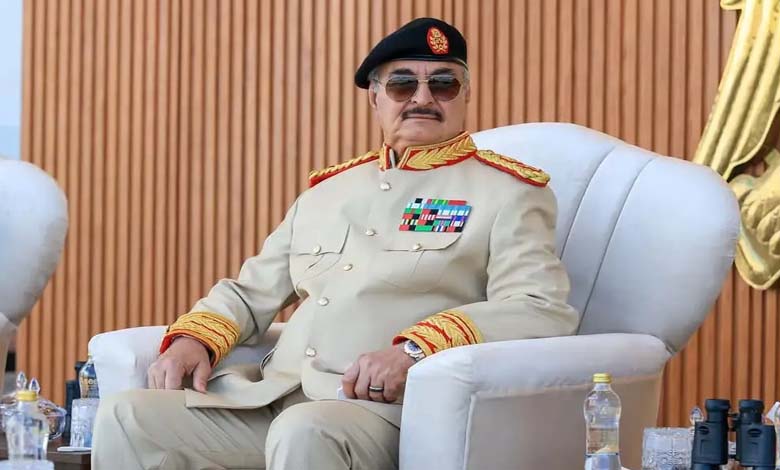Haftar pursues calculated plans to impose himself as a key player in Libya

Libyan National Army commander Field Marshal Khalifa Haftar’s decision to expel a European ministerial delegation reveals growing pressure on European powers to recognize the legitimacy of eastern Libya.
-
Dbeibah Turns to the Muslim Brotherhood, Haftar Warns of Decisive Moment… Libya on a Knife’s Edge
-
Financial Strangulation and Stalled Dialogue with Haftar Threaten Dbeibah’s Government Continuity
By removing a European delegation that had just arrived in eastern Libya, Haftar aimed to send a clear message: to position himself as an indispensable actor in the Libyan political scene—even if the international community does not formally recognize him, according to analysts.
On July 8, an EU commissioner and the foreign ministers of Greece, Italy, and Malta visited Libya to discuss irregular migration. After a stop in Tripoli, they traveled to Benghazi.
-
Haftar urges the formation of a unified government to oversee the elections
-
Al-Menfi and Haftar in Cairo to Break Political Deadlock
Libya has suffered from instability since the 2011 ousting of Muammar Gaddafi. Two rival governments claim authority: the UN-recognized Government of National Unity (GNU) in Tripoli, led by Abdelhamid Dbeibah, and a parallel government in Benghazi, headed by Osama Hammad and backed by Haftar.
Upon the delegation’s arrival at Benghazi airport, eastern authorities ordered them to leave. The Hammad government issued a sharply worded statement accusing the delegation of “a blatant violation of diplomatic norms” and “disrespect for national sovereignty” for failing to follow entry and movement procedures for foreign diplomats.
-
Libya: Haftar Declares ‘Last Chance’ to Draw Road Map and Hold Elections
-
Haftar asks Libyans to chart the future after International failure
The delegation was declared “persona non grata” and asked to leave Libyan territory.
In Brussels, an EU official admitted a “regrettable protocol breach,” citing a “major misunderstanding” about which Libyan entity the delegation was to meet. The European Commission also referred to a “protocol issue” that led to the cancellation of the visit to Libya’s second-largest city.
Tarek Megerisi, a researcher at the European Council on Foreign Relations, described the expulsion as a “calculated move.” Given the rise in migrants arriving in Crete from Libya, Haftar may be trying to leverage the migration crisis to gain de facto European recognition of his government and expand his relationships beyond those of a local military leader.
-
Libyan army denied meeting of Field Marshal Khalifa Haftar, with the outgoing Prime Minister
-
Haftar present his backing to Libya’s peace operation
Due to the complex Libyan context, diplomats must tread carefully. The EU officially supports the Tripoli-based government but maintains contact with Haftar’s forces and his sons.
The delegation was initially set to meet with eastern Libyan military officials. However, upon arrival, they found “individuals we had not agreed to meet,” according to an anonymous EU source, prompting the delegation’s immediate departure.
Claudia Gazzini, a Libya expert at the International Crisis Group, believes the move was likely not pre-planned. She questioned why ministers from Hammad’s government were at the airport and why Haftar allowed the situation to unfold. She also suggested a bilateral dispute with one of the represented countries may have played a role.
-
Libya’s Haftar declares that he will lift his blockade of oil production for one month
-
US embassy: Haftar engaged to ending oil blockade
Researcher Jalel Harchaoui pointed to Greece as the main target. On July 6, the Greek foreign minister reportedly demanded migration and maritime concessions without offering anything in return. A meeting with Haftar yielded no results. Two days later, a Greek representative returned as part of the EU delegation, attempting to meet both Libyan governments equally, which Benghazi authorities viewed as an insult.
According to Harchaoui, the incident highlights the need not to underestimate Haftar’s foreign policy strategy. “Whether it’s migration or energy, the Haftar family is indispensable because of its control over eastern coastal security,” he said.
-
Al-Mishri and Aguila Saleh discuss steps to form a new government in challenge to Dbeibah
-
Counterfeit Billions in Libya Prompt Dbeibah to Demand Immediate Investigation
Wealthy and influential, the Haftar family is expanding international outreach. In February, French President Emmanuel Macron received Khalifa Haftar in Paris. In May, he visited Moscow and met Russian President Vladimir Putin. His son Saddam has toured the U.S., Turkey, Italy, and Niger.
Even Turkey, which helped repel Haftar’s 2020 offensive on Tripoli, now seeks to benefit from ties with the family—especially through construction projects. Ankara is also eyeing Haftar’s approval of a maritime boundary deal with Tripoli, viewed by Athens as illegal.
-
Violence erupts in Tripoli after protesters opposing Dbeibeh are dispersed
-
Dbeibeh Unveils Political Initiative with Three Tracks to Contain Public Anger












